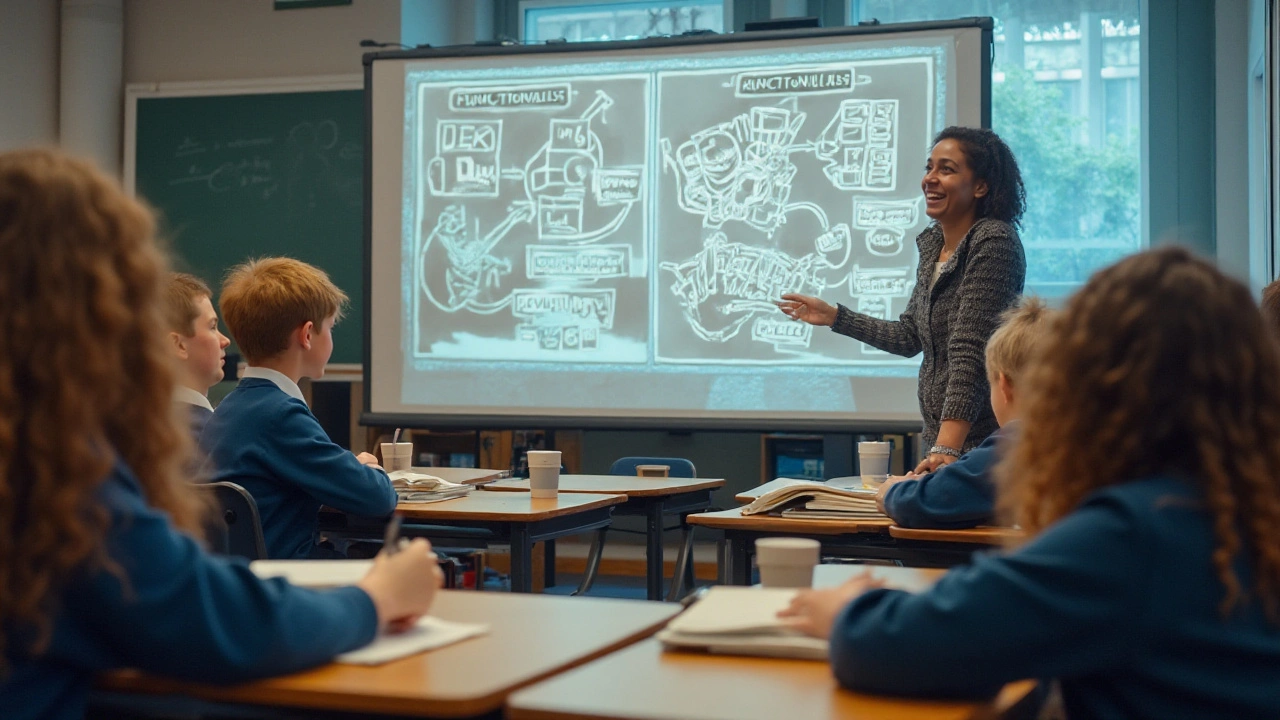Functionalism's Role and Impact on Modern Education Systems
 Sep, 9 2024
Sep, 9 2024
Functionalism is a theory that views society as a complex system whose parts work together to promote solidarity and stability. It's fascinating to see how this approach has permeated the education sector over the years.
The roots of functionalism can be traced back to early sociological thought, with Emile Durkheim being one of its principal proponents. He believed that education serves several crucial roles in society, like socializing individuals and maintaining social norms.
Modern education systems around the globe still carry the fingerprint of functionalist thought. This perspective helps in understanding how schools serve not just academic purposes, but also social ones. It’s an overarching framework that helps educators understand why certain structures and practices exist within educational systems.
Despite its widespread influence, functionalism is not without its critics. Many argue that it overlooks the inequalities present in the education system. Yet, understanding both its strengths and weaknesses provides a comprehensive view of its role in shaping education as we know it today.
- Understanding Functionalism
- Historical Context and Key Proponents
- Application in Modern Education
- Challenges and Criticisms
Understanding Functionalism
Functionalism is a sociological theory that looks at society through a macro-level orientation, which is a broad focus on the social structures that shape society. It sees society as a complex system whose parts work together to promote solidarity and stability. This perspective on society first gained prominence through the works of early sociologists like Emile Durkheim and Talcott Parsons. They argued that every aspect of society—no matter how minor it may seem—serves a purpose or function, thereby contributing to the stability and sustainability of society as a whole.
Emile Durkheim, often regarded as the father of sociology, laid much of the groundwork for the functionalist perspective. He argued that societal institutions, including education, religion, and family, all play vital roles in maintaining social cohesion. Durkheim focused a lot on how education systems serve to socialize individuals, teaching them the norms, values, and roles they need to integrate successfully into society. According to him, "Education is the influence exercised by adult generations on those that are not yet ready for social life." This quote underscores the role of education in preparing individuals for their societal roles.
In the context of education, functionalism identifies several key functions. One major function is socialization, where schools instill shared cultural values and norms in students. Schools also act as sorting mechanisms that allocate individuals to different roles and responsibilities based on their abilities and skills. From this perspective, the education system helps to perpetuate social stability by producing a well-functioning, competent workforce. Another significant function is innovation, as educational institutions foster critical thinking and problem-solving skills necessary for societal progress.
Critics, however, argue that functionalism tends to overlook the inequalities and power dynamics within society. For instance, while it acknowledges that education sorts individuals for different social roles, it often ignores the barriers that prevent equal access to education. Hence, while functionalism provides a useful framework to understand the positive aspects of social institutions, it is essential to consider its limitations. Despite these criticisms, the theory’s emphasis on the interconnectedness of societal elements makes it invaluable for understanding the broader implications of various social practices.
Modern examples of functionalism in education can be seen in standardized testing and curricula that aim to create a cohesive national identity. For instance, the existence of national history or civics courses is a testament to how education systems instill a unified set of beliefs and values. Moreover, the emphasis on meritocracy within education—where students are rewarded based on their abilities and efforts—reflects a functionalist approach by promoting stability and efficiency within the society. Data from various educational studies often show higher performance levels in students who experience a strong alignment between their home and school environments, further validating this theory.
Understanding functionalism's impact on education also helps educators and policymakers develop strategies to enhance educational practices. Identifying the roles schools play can help in designing curricula that not only impart academic knowledge but also promote social skills and values. This comprehensive approach can lead to more holistic educational experiences that benefit both the individual and society. Functionalism may not provide all the answers, but it certainly offers a strong foundational framework for exploring the multifaceted nature of education systems.

Historical Context and Key Proponents
Functionalism as a sociological theory primarily emerged in the late 19th and early 20th centuries. The theory originated as scholars sought to understand how societies maintain internal stability and survive over time. This period saw rapid industrialization and social changes, prompting thinkers to explain how societies organize themselves.
The foundational figure in functionalism is Emile Durkheim, who is often regarded as the father of sociology. Durkheim believed that social institutions, including the education system, exist to fulfill essential functions for society. His work, particularly on the role of education, has had lasting impacts. He argued schools are not just venues for academic learning but also moral education. In his view, schools inculcate values and norms, helping to integrate children into society. He wrote in "The Division of Labor in Society," that education is crucial for social integration.
Talcott Parsons further developed Durkheim's ideas in the mid-20th century. Parsons emphasized how education serves to maintain social order by transmitting culture and creating social solidarity. In his work, he discussed how schools function as a societal mechanism to sort and classify individuals based on merit, aligning students with roles that fit their abilities. This concept is often referred to as meritocracy, a principle still prevalent in modern education systems.
Another key proponent was Robert K. Merton. Merton expanded functionalism by introducing the idea that institutions could have both manifest and latent functions. Manifest functions are the intended consequences of an institution, like teaching math and science in schools. Latent functions are the unintended but still significant outcomes, such as the formation of peer relationships and development of a youth culture. His work helped broaden the functionalist perspective, making it more comprehensive.
Interestingly, the influence of these theorists extended beyond just sociological fields. Their ideas permeated educational policies worldwide. For instance, in the United States during the 20th century, educational reforms often aligned with functionalist principles. The introduction of standardized testing and tracking systems reflected the meritocratic ideas advocated by Parsons. As educators and policymakers aimed to sort students efficiently, these practices gained prominence.
"Education is the transmission of civilization," observed historian Ariel Durant, emphasizing how schools perpetuate societal norms and values. This functionalist perspective underlines education's role in maintaining societal stability.
Functionalism, however, hasn't been without criticism. Critics argue that it often overlooks the inequalities within the education system. They claim that by focusing too much on the macro-level functions of education, functionalist theories miss the experiences of marginalized groups. Despite these criticisms, functionalism has provided a powerful lens for understanding the multifaceted roles of education in society. The contributions of Durkheim, Parsons, and Merton remain pivotal in sociological studies and continue to shape educational discourse today.

Application in Modern Education
Think about the schools today. They do more than just teach math, science, and reading. They shape the future by being a crucial part of society. This is where the idea of functionalism comes into play. Functionalism in education isn't just a relic from the past; it actively defines how schools operate even today. Schools socialize students, instill shared values, and prepare them to be active members of society.
One significant way functionalism manifests is through the hidden curriculum. This term refers to the implicit lessons students learn in school, such as respecting authority, listening to others, and working effectively in groups. These lessons aren't part of any formal curriculum but are essential for social cohesion. Emile Durkheim himself believed that schools act as a 'society in miniature,' where children learn to get along with others and understand societal norms.
The role of extracurricular activities is another striking example. Whether it's sports, music, or drama, these activities help students develop skills not typically covered in regular classes. They learn teamwork, time management, and leadership - skills that are highly valued in the job market. According to a study published in the American Journal of Sociology, participation in these activities is linked to higher levels of community engagement later in life.
"Education is the transmission of civilization." - Ariel and Will Durant
Standardized testing is another facet influenced by functionalist theory. These tests are designed to measure educational achievement and are often used to ensure accountability and equal standards across schools. While controversial, they are a way to ensure that the primary role of education - imparting knowledge - is being met. Although critics argue that these tests can be stressful and do not capture all aspects of learning, they serve an essential role in maintaining educational standards.
Functionalism also helps us understand the structure of modern educational institutions. Schools are organized in a hierarchical manner, mimicking other institutions in society like workplaces and government bodies. This structure teaches students about authority and hierarchy, important aspects of social life. According to sociologist Talcott Parsons, schools are the focal point of society where children are molded into proper social roles.
Modern education policies continue to be shaped by functionalist principles. For example, many countries have introduced civic education as a part of the core curriculum. The aim is to ensure that students not only understand their rights and duties as citizens but also appreciate the importance of participating in civic activities. This is a clear nod to the functionalist belief in the role of education in maintaining social order.
Despite its many contributions, functionalism is often criticized for its perceived lack of attention to educational inequalities. Critics argue that while functionalism explains the role of education in maintaining social stability, it does not account for the ways in which the education system can perpetuate social inequalities. For instance, schools in affluent areas often have more resources than those in poorer regions, leading to a gap in educational opportunities. Recognizing these limitations is important for a balanced understanding of the theory's impact on modern education.

Challenges and Criticisms
As influential as functionalism has been in shaping modern education systems, it has also faced a fair share of criticism. One of the main objections revolves around its tendency to reinforce the status quo. Critics argue that by emphasizing social cohesion and stability, functionalism inherently supports the existing social structures, including inequality. This perspective often glosses over the disparities in access to educational resources, opportunities, and outcomes between different socioeconomic groups.
Another significant criticism focuses on the lack of emphasis on the individual. Functionalism often prioritizes the needs of society as a whole over individual aspirations and needs. This can lead to a one-size-fits-all approach in education, which may not be suitable for everyone. For instance, standardized testing is an application of this principle, but it has been criticized for failing to account for diverse learning styles and abilities.
Moreover, functionalism has been criticized for its overly deterministic view. By suggesting that every part of society has a function and contributes to social stability, it leaves little room for human agency and change. This viewpoint can be limiting because it does not adequately address how individuals and groups can influence societal structures and enact change within the education system.
Functionalism also tends to overlook the role of conflict and power dynamics in education. Marxist critics, for example, argue that the education system is a site of ideological control, where the values and norms of the ruling class are propagated to maintain their dominance. This stands in stark contrast to the functionalist view of education as a neutral, cohesive force. The conflict theory perspective brings to light the inequalities perpetuated by functionalist approaches to education.
Despite these criticisms, it's worth noting that functionalism offers valuable insights into the role of education in society. However, it's essential to balance its insights with other perspectives to create a more inclusive and equitable education system. For instance, incorporating viewpoints from critical pedagogy can help address some of the shortcomings of functionalist approaches. By doing so, educators and policymakers can better understand the complex dynamics at play and work towards a system that serves all students equitably.
"Education is the most powerful weapon which you can use to change the world," Nelson Mandela once said. This quote underscores the potential of education not just as a function of society, but as a transformative force capable of challenging and changing social structures.
The criticisms of functionalism are not merely academic; they have real-world implications. Understanding these challenges is crucial for anyone invested in the future of education. By acknowledging its limitations, we can work towards an education system that truly serves the needs of all individuals, promoting not just social stability, but also equity and justice.